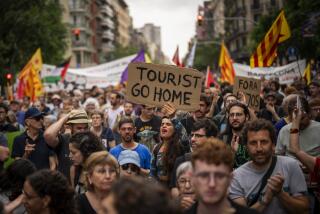Tourists’ Road Map to Safety
- Share via
Peter Tarlow tells people about the time he visited Honolulu and asked a police officer what areas of town were safe for visiting.
“He told me the only safe place was my hotel room with the door locked.”
Wrong. Tarlow and his audiences shudder together. Tarlow, you see, is a tourism consultant who specializes in safety issues.
Last week, he and Det. Ray Wood of Orlando, Fla., spoke together at a tourism conference in Anaheim. They offered a variety of tips--both for the tourist and for those the tourists trust to watch out for their welfare, such as the police and hotel/entertainment businesses.
Those groups, Tarlow and Wood suggest, need to become goodwill ambassadors.
“This tourist is important to your economic base,” Wood said. “You want this tourist to return, again and again.”
So, you do not tell tourists the only safe place is their hotel room. If crime is that bad, Wood and Tarlow contend, then you work together to reduce it so tourists feel more secure.
In Orlando, Wood is head of a sheriff’s crime prevention program that targets the tourism industry. Police officers are trained to deal with tourists--especially those who do not speak English.
“People from other countries don’t always know your rules and regulations,” Wood said. “Believe me, customer service is a crime-prevention tool.”
But another important police role is working with the hotels and the tourism venues.
“If we suspect a pickpocket working one hotel, within minutes we have that information faxed to 46 different operations that are part of our system,” Wood said. “They’ll be ready if he shows up anywhere else.”
The other side of all this, of course, is that tourists have an obligation to protect themselves. And Wood has plenty of tips:
* Start with a reputable travel agent. Some, he said, are so inept they put tourists in seedy hotels in bad parts of town. Get one that knows the area.
* Tell yourself that you’ll spend an extra $20 a night on your hotel to upgrade to the better places, which are usually safer.
* Avoid hotels with room keys; they can be duplicated easily. Stay only where coded cards are used.
* Pickpockets are still in business, but most of them work in groups that Wood calls “distraction teams.”
“One person will bump into you and rub catsup on your shirt or blouse, and then point it out to you,” Wood explained. “You’ll be so upset you won’t notice his partner has grabbed your purse or your briefcase.”
* Never go alone to a bar or restaurant in an unfamiliar part of town.
* As silly as this might sound, Wood warned, don’t open your hotel door just because somebody on the other side knocks.
“You wouldn’t do that at home. Why would you do it in a strange city?” he said. “But we have a lot of people robbed just for that reason.”
* Don’t act like a tourist. “Carry yourself as someone who belongs, as if you own the street,” Wood said. “In Orlando, we get the guy with the sunburn in shorts and sandals with black socks, reading the map while he walks. People like that are easy prey for criminals.”
Anaheim, by the way, does not have a tourism police unit as Orlando does. But Anaheim police spokesman Sgt. Joe Vargas said its officers are receiving more and more tourism training. And a tourism unit may be included in the department’s plans to coincide with the Disneyland expansion.
More to Read
Sign up for The Wild
We’ll help you find the best places to hike, bike and run, as well as the perfect silent spots for meditation and yoga.
You may occasionally receive promotional content from the Los Angeles Times.






